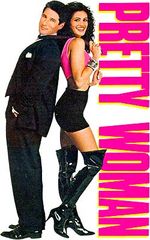Pretty Woman: Difference between revisions
(Created page with "<html><div class="mw-content-ltr" dir="ltr" id="mw-content-text" lang="en"><div class="thumb tright"><div class="thumbinner" style="width:152px;"><a class="image" href="/index.php?title=File:Pretty_Woman-1.jpg"><img alt="Pretty Woman-1.jpg" class="thumbimage" height="240" src="/images/thumb/f/f9/Pretty_Woman-1.jpg/150px-Pretty_Woman-1.jpg" width="150"/></a> <div class="thumbcaption"><div class="magnify"><a class="internal" href="/index.php?title=File:Pretty_Woman-1.jpg"...") |
(Page conversion via llm-mediawiki-rev -jwm) |
||
| Line 1: | Line 1: | ||
[[File:Pretty_Woman-1.jpg|thumb|right|150px]] | |||
''The movie that launched a million tattoos?'' | |||
Is '''Pretty Woman''' the first movie to glamorize [[Kanji|kanji]] tattoos? ''Pretty Woman'' was released in 1990, which puts it drastically ahead of that trend. You may remember the scene where Julia Roberts is asked "what does that mean?" of the kanji tattoo on her back. | |||
Her reply, "It means strength of heart." | |||
The punchline? No, it doesn't. It means "STRONG." Strong, like manly strong. Strong, like can-lift-a-heavy-weight strong. (See the entry "[[Strong kanji]]" for more information) | |||
But still, thousands and thousands of women (and men) got the exact same tattoo placed on their bodies, and ''Pretty Woman'' played an important role in the popularization of both kanji tattoos and tattoos for mainstream women. | |||
== Plot == | |||
''"A wealthy businessman hires a prostitute while on a trip to Los Angeles. He offers her money to stay with him for a week to accompany him to various society outings where he feels he should have a date on his arm."'' | |||
- ''Tribute Magazine'' | |||
== See Also == | |||
* [[Strong kanji]] | |||
Latest revision as of 10:04, 17 September 2023
The movie that launched a million tattoos?
Is Pretty Woman the first movie to glamorize kanji tattoos? Pretty Woman was released in 1990, which puts it drastically ahead of that trend. You may remember the scene where Julia Roberts is asked "what does that mean?" of the kanji tattoo on her back.
Her reply, "It means strength of heart."
The punchline? No, it doesn't. It means "STRONG." Strong, like manly strong. Strong, like can-lift-a-heavy-weight strong. (See the entry "Strong kanji" for more information)
But still, thousands and thousands of women (and men) got the exact same tattoo placed on their bodies, and Pretty Woman played an important role in the popularization of both kanji tattoos and tattoos for mainstream women.
Plot
"A wealthy businessman hires a prostitute while on a trip to Los Angeles. He offers her money to stay with him for a week to accompany him to various society outings where he feels he should have a date on his arm." - Tribute Magazine
